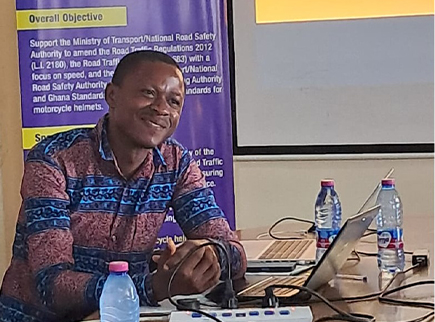Legal Resources Centre has urged the government to integrate road safety measures into the 24-hour economy policy, cautioning that extended commercial activity can heighten traffic crashes unless helmet standards, enforcement, and safer road designs are prioritised.
The Centre highlighted the urgent need to ensure that road safety planning was central to the 24-hour economy, stressing that extended business hours without reforms could lead to more crashes and fatalities.
Mr. Enock Jengre, Programmes Officer of the LRC made this call on the sidelines of the second Road Safety Journalism Training in Accra, held under the project “Supporting Advocacy Interventions towards the Passage of the Reviewed Road Safety Act and the Development of Standards on Motorcycle Helmets.”
He advised that infrastructure design, helmet regulations, and enforcement must align with the anticipated increase in transport activity when the 24-hour economy is fully operationalised.
He indicated that the government’s plan to stimulate growth through a 24-hour economy should not overlook road safety.
He argued that late-night traffic, poor visibility, and increased use of motorcycles and tricycles posed heightened risks if dedicated lanes and protective standards were not enforced.
“More economic activity means more movement of people and goods at all hours. Without safer roads and proper helmet standards, the 24-hour economy could worsen fatalities rather than reduce hardship,” he added.
He said motorcycles have increased by more than 1,500 percent in recent years, yet roads remain largely designed for cars and trucks.
According to him, the absence of dedicated motorcycle or bicycle lanes many times forced riders into direct conflict with larger vehicles, increasing crash risks.
Mr. Jengre also urged Parliament to accelerate the passage of the revised Road Traffic Act and to support the enforcement of national helmet standards currently under review.
“Optional standards will not work. Ghana needs binding regulations to save lives,” he said.
Adding, “An economy that runs round the clock means more road use and more exposure to risks. Without stronger speed enforcement, traffic calming, and nighttime visibility measures, crashes will rise.”
Mr. Jengre stressed that Ghana’s 24-hour economy cannot succeed without deliberate investment in safer road infrastructure, stronger institutional enforcement, and public awareness campaigns.
“Every day, at least eight people die on Ghana’s roads. If safety is neglected, the 24-hour economy could multiply this toll. Safer design, stronger laws, and a culture of responsibility are not optional; they are essential,” he said.
Mr. Denis Yeribu, Principal Planning Manager at the National Road Safety Authority (NRSA), stated that speeding accounts for over 60 percent of collisions nationwide, emphasizing the need for coordinated action among various agencies to prevent further escalation.
He said fatalities remain disproportionately high in Ashanti and Greater Accra regions, which together account for nearly three-quarters of national road deaths.
Ms. Mavis Nana Ama Obeng-Mensah, Communication Officer at the Bloomberg Initiative for Global Road Safety (BIGRS) Ghana, emphasized the crucial role of the media in shaping public behavior to promote road safety and prevent avoidable crashes and fatalities.
She noted that campaigns such as “School Girl” and “Surgeon” in Accra significantly influenced perceptions about speeding, with more residents reporting that they obeyed limits and persuaded others to do so.
Road traffic fatalities in Ghana continue to rise, with 1,937 deaths recorded between January and August 2025, according to the National Road Safety Authority.
Motorcycle-related crashes are surging, with over 1,500 incidents reported in the first half of the year alone.
The Ashanti Region leads with 41 per cent of fatalities, followed by Greater Accra (34 per cent) and Eastern Region (25 per cent), highlighting the risks in high-traffic urban corridors.
Speeding remains the top cause, contributing to over 60 per cent of crashes, alongside inexperience, fatigue, and drunk driving.
Experts warn that under-reporting may mask the true scale of the crisis.
Categories
Editor's Pick
LRC Urges Government to Embed Road Safety in 24-Hour Economy

